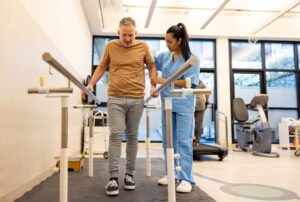Healthful post-operative care for dialysis patients begins within the confines of your own living room. The power is actually in your hands to set an environment that brings comfort and fosters healing. Imagine having a domain with all vital items you need around you – from medications to favorite books, with just the right room temperature. A surprising twist isn’t it? But rest assured, setting this up is as easy as organizing a weekend picnic. Now, let’s walk down the necessary steps to getting there.
Post-operative care and dialysis recovery involve regular check-ins with medical professionals, maintaining a balanced diet, and monitoring health signs and vital parameters. Daily medication management and proper wound care are also crucial aspects of the recovery process. Additionally, engaging in physical activities such as light movements or walking can aid in the overall recovery process.
Preparing for Home Recovery After Dialysis
The recovery period post-dialysis is a crucial phase that requires specific preparations to facilitate a smooth healing process at home. Creating a supportive and comfortable environment is vital to optimize the recovery journey.
It’s essential to designate a comfortable rest area within your home, equipped with cozy seating arrangements, like an armchair or cushioned sofa, to ensure relaxation without strain. Moreover, maintaining a comfortable room temperature contributes to overall well-being and comfort during recovery. Having essential items within easy reach minimizes physical strain, promoting a stress-free recovery environment by ensuring medications, water, tissues, and other necessities are readily accessible.
In addition to creating a comfortable environment at home, carefully following discharge instructions from your medical team plays a pivotal role in ensuring a successful recovery.
Carefully Following Discharge Instructions
After being discharged from the healthcare facility, closely adhering to the instructions provided by your medical team is crucial for effective post-dialysis care. This includes wound care, medication schedule, and activity restrictions. Understanding and following these instructions are imperative for optimizing the recovery process.
Comprehensive comprehension and meticulous adherence to wound care protocols are fundamental for promoting optimal healing and reducing the risk of infections or complications. Adhering to the medication schedule as directed ensures consistent intake in accordance with prescribed dosages. Honoring activity restrictions safeguards well-being during the recovery phase.
Furthermore, arranging supportive care from family members or professional caregivers can provide invaluable assistance during the recovery period.
Arranging Supportive Care
Seeking assistance from family members or professional caregivers relieves practical burdens during the recovery process, allowing individuals to prioritize health and well-being without feeling overwhelmed. Their support conserves energy for self-care activities and promotes a nurturing atmosphere conducive to healing. Professional caregivers can offer specialized aid tailored to individual needs, providing personalized support such as transportation to medical appointments or meal preparation.
Embracing supportive care fosters an environment of compassion that enhances the overall recovery experience, empowering individuals with a solid support system that nurtures their physical and emotional well-being during recuperation.
In this critical phase of post-dialysis care, preparing for home recovery lays the groundwork for successful healing. Now let’s shift our focus to dietary guidelines and hydration tips that play a crucial role in post-dialysis well-being.
Dietary Guidelines and Hydration Tips
After undergoing dialysis, adjusting your diet to support your body’s healing and overall health is crucial. Proper nutrition plays a significant role in your recovery journey. Let’s explore how you can make the right choices for your diet and manage fluid intake for optimal well-being.
When it comes to post-dialysis nutrition, prioritizing high-quality protein sources is vital for replenishing lost nutrients and promoting muscle strength and healing. Lean meats, fish, eggs, and dairy products are excellent options to incorporate into your diet. These protein-rich foods aid in repairing tissues and improving overall health during the recovery phase. However, it’s equally important to be mindful of certain nutrient restrictions, especially potassium and phosphorus. While these minerals are essential for your body, excessive intake can pose risks to your health. Thus, it’s crucial to limit foods high in potassium and phosphorus to prevent potential complications. For instance, incorporating white bread instead of whole grain and choosing low-phosphorus dairy options can help manage these nutrient levels effectively.
Understanding the importance of dietary adjustments and fluid management following dialysis lays a strong foundation for your recovery journey. Now, we will delve into striking the right harmony between medication and physical activity to further enhance your post-dialysis well-being.
Balancing Medication and Physical Activity
After a major medical procedure like dialysis, it’s crucial to incorporate proper medication management and physical activity into your recovery plan. This is the time to strictly adhere to the prescribed medication regimen and keep a keen eye out for any potential side effects.
Medication Management: Being organized with your medication schedule and ensuring you understand the dosages is key. Consider setting reminders or using pill organizers to stay on track. It’s equally important to be aware of any potential drug interactions and adverse reactions that may occur. Remember, never hesitate to reach out to your healthcare provider if you have any concerns or questions about your medications. Open communication with your healthcare team is vital in ensuring successful recovery.
Physical Activity: After dialysis, you may not feel as strong or energetic as before, but gradually increasing physical movement is essential in regaining strength and flexibility. Start with light activities such as short walks or gentle stretching as advised by your healthcare team. It’s important to build up slowly, listening to your body, and staying within the limits set by your medical professionals.
Engaging in physical activity not only helps in the recovery process but also aids in improving overall well-being. It reduces stress, enhances mood, and boosts energy levels, all of which are beneficial for a successful recovery.
Take it from John, who diligently followed his post-dialysis exercise routine under the guidance of his healthcare team. Starting with simple stretching exercises and gradually advancing to light aerobic activities significantly improved his muscle strength and endurance over time, enhancing his overall recovery experience.
So remember, whether it’s carefully managing your medications or gradually incorporating physical activity into your routine, both are essential components in achieving a successful dialysis recovery.
As you continue down the path of recovery, it’s crucial to remain vigilant about your health. Now, let’s explore the critical aspects of monitoring health and recognizing complications.
Monitoring Health and Recognizing Complications
In the days following your dialysis procedure, it’s essential to closely monitor how your body is responding to the treatment. Your body constantly sends out signals, and it’s crucial to recognize these signs. Here are a few points to consider:
Tracking Vital Signs
One way to monitor your health is by keeping track of your vital signs, such as blood pressure, temperature, and heart rate. Any significant deviations from your normal readings should be reported to your healthcare provider promptly.
Keeping a journal or using a health app for frequent measurements can help identify trends or anomalies that might signal underlying issues. It’s important not to dismiss minor fluctuations and bring them to your doctor’s attention if they persist.
Educating Yourself on Warning Signs
Understanding the warning signs post-dialysis is crucial for your well-being. Some common complications to watch out for include sudden weight gain, shortness of breath, chest pain, excessive fatigue, and changes in urine output. Your healthcare team should provide you with detailed information about these indicators and when to seek immediate medical attention.
Being aware of these warning signs empowers you to act quickly and seek medical assistance when necessary. Remember, it’s always better to have your symptoms evaluated promptly than to ignore potential issues that could worsen over time.
Regular Follow-Up Appointments
Another vital aspect of monitoring your health after dialysis is attending regular follow-up appointments with your healthcare provider. These sessions are essential for assessing your overall recovery progress, discussing any concerns or complications you may have experienced, and performing relevant diagnostic tests.
During these follow-up visits, your doctor will closely monitor your vital signs, conduct necessary blood tests, and address any lingering questions or uncertainties you may have regarding your recovery.
By actively monitoring your health post-dialysis and familiarizing yourself with potential complications, you are empowering yourself to navigate the recovery process more effectively. Taking these proactive steps plays a crucial role in ensuring a smoother healing journey.
Optimizing Quality of Life During Recovery
Recovering from a dialysis procedure often involves taking steps to ensure you’re physically and emotionally comfortable. Creating a supportive environment can help to promote relaxation, rest, and overall well-being. Here are some tips to optimize your quality of life during this recovery period.
Temperature Control
First off, ensuring a comfortable and stable temperature in your recovery environment is crucial. You want to make sure that the room where you’re recovering isn’t too cold or too warm. Extreme temperatures can impact how you feel and how well you’re able to sleep. If it’s too cold, you might feel uncomfortable and tense, but if it’s too warm, it might be hard for you to fall asleep. Finding the right balance is key.
You can use fans or open windows to cool down a room if it’s too warm, and use blankets or warmer clothing if it’s too cold. Making these adjustments will allow you to create an environment that’s just right for your comfort, aiding in your relaxation and recovery process.
Emotional Well-being
Another important aspect of optimizing your quality of life is maintaining your emotional well-being. Engaging in activities that bring you joy and relaxation can significantly support your emotional well-being during the recovery phase. It’s often easy to put recovery first, but caring for your mental state is equally as important.
Spend time doing things that make you happy – whether it’s reading a favorite book, listening to soothing music, or engaging in a hobby. Surrounding yourself with positive stimuli can have immense therapeutic benefits. Consider incorporating mindfulness techniques or meditation into your daily routine to help calm and center your mind. Taking walks outdoors or engaging in gentle stretching exercises can also provide physical activity, release endorphins, and contribute to a sense of well-being.
By focusing on maintaining comfortable environmental conditions and nurturing emotional well-being during your recovery process, you’ll be better equipped to navigate this phase with ease and positivity.
Transitioning Back to Normalcy Post-Dialysis is a significant milestone in the journey of recovery, marking the shift towards resuming daily routines with renewed vigor and confidence.
Transitioning Back to Normalcy Post-Dialysis
The transition back to normalcy post-dialysis marks a significant milestone for patients as they strive to regain their independence and reconstruct routines that bring a sense of normality. It’s essential to approach this phase with patience, care, and a holistic perspective that embraces physical, emotional, and social aspects.
It’s important for healthcare providers and caregivers to empathetically address these emotional concerns by creating a supportive environment where patients feel comfortable expressing their feelings. Encouraging patients to engage in light physical activities, such as short walks or gentle stretches, not only promotes physical well-being but also contributes to emotional resilience.
Encouraging patients to participate in support groups or connect with individuals who have undergone similar experiences can provide valuable emotional support and validation as they navigate the transition period. Having a supportive network of peers who understand the challenges and triumphs associated with post-dialysis recovery can significantly contribute to a smoother adjustment back to normalcy.
As patients reintegrate into their pre-dialysis routines, closely monitoring their progress is important. Each individual’s experience during this transition phase is unique, and personalized support plays a vital role in ensuring a successful reentry into everyday life.
By addressing both the practical aspects, such as work and social engagements, and the emotional concerns associated with post-dialysis recovery, healthcare providers can offer comprehensive support that empowers patients to navigate this transitional phase with confidence and resilience.
For comprehensive post-dialysis care assistance, please visit Four Seasons Healthcare Services.












